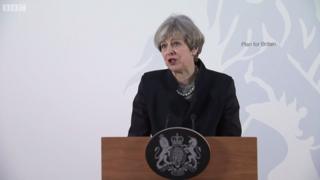
Mrs May addressed staff at the Department for International Development in East Kilbride ahead of her meeting with Ms Sturgeon
Leaving the European Union will be an opportunity to strengthen the ties between the nations of the United Kingdom, Theresa May has said.
The prime minister was speaking during a visit to Scotland, which will see her meet First Minister Nicola Sturgeon later.
She told an audience of civil servants in East Kilbride that she wanted Brexit to lead to a “more united nation”.
Mrs May will formally trigger Article 50 on Wednesday.
But in a speech to staff at the Department for International Development (DFID), she pledged that leaving the EU would not mean the UK “stepping back from the world”.
And she insisted she was aiming to build “a new partnership with Europe” while taking the opportunity to build “a more global Britain”.
- What is Article 50?
- Do voters want a second referendum?
- All you need to know about Brexit
- Brexit deal must meet six tests, says Labour
Mrs May was speaking as Labour outlined “six tests” that will need to be met in order for it to support any Brexit deal negotiated by the government.
The prime minister added: “As Britain leaves the European Union, and we forge a new role for ourselves in the world, the strength and stability of our Union will become even more important.”
Ms Sturgeon has called for a second referendum on Scottish independence to be held in the wake of the Brexit vote, with the Scottish Parliament expected to formally back her plan on Tuesday.
The first minister has said that a second referendum should be held ahead of the UK’s EU departure to give the people of Scotland a choice between what she calls a “hard Brexit” and becoming an independent country.
The Scottish government has also criticised what it says is a lack of consultation from Westminster over Brexit, which it argues has led to Scotland’s voice being ignored.
Mrs May has said that “now is not the time” for a Scottish independence referendum, but has not ruled out one being held after the Brexit process is complete.
And in an impassioned plea for the preservation of the UK, she said the nations of the United Kingdom were an “unstoppable force” when they acted together.
Ms Sturgeon wants to hold a referendum in autumn next year or spring 2019
Mrs May – who did not take questions following her 10-minute speech, which focused largely on DFID’s international aid work – also said the UK was “a force for good, helping to build a better future for everyone”.
She added: “As we look to that future and as we face this great national moment together, I hope you will continue to play your part in the great national effort we need to build the stronger Britain, the fairer Britain, the more outward-looking Britain and the more united Britain that I am determined we should be once we emerge from this period of national change.”
Downing Street says the talks between Mrs May and Ms Sturgeon are for issues surrounding the triggering of Article 50 – and not the possibility of a second independence referendum.
But Scottish government sources have said the talks cannot just focus on Brexit.
Triggering Article 50 begins a two-year negotiation process to attempt to reach a deal before Britain officially leaves the EU in March 2019.
- Indyref2: Your questions answered
- Brexit: What would a ‘no deal’ look like?
- Great Repeal Bill: What we know so far
The government is also due to publish its Great Repeal Bill, giving powers to amend some EU laws, on Thursday.
BBC political editor Laura Kuenssberg told BBC Radio 4’s Today that Mrs May will be treading a fine line in her conversations with Ms Sturgeon. “One of the dizzying aspects of all of this is how does the prime minister extricate us from one union, while trying to preserve the other.
“She will reinforce the possibility that as powers come back from Brussels, whether over fishing, farming or anything else, they could go to the devolved administrations… but she’s not at a stage of making promises on specifics.”
Ahead of the visit, a spokesman for Scotland’s Brexit Minister Michael Russell said there had been “no discussion” with the Scottish government over what will be in the letter triggering departure from the EU.
He added that the Scottish government had not been consulted over whether Scotland’s interests will be represented, what role the Scottish government will play in negotiations, nor which powers the Tories intend to take for Westminster and which powers will be determined by Holyrood.
Mr Russell said there had also been no discussion over the the financial impacts of Brexit and “the consequences for jobs and the economy in Scotland”.
He added: “There are clearly a lot of areas where we hope the prime minister intends to provide answers.
“We believe it should be for the people of Scotland to decide their own future, which is why we will return to parliament on Tuesday to seek a mandate to begin discussions on a referendum that will put Scotland’s future in the people’s hands.”
Get news from the BBC in your inbox, each weekday morning
Do you have a question about Article 50? Or a question about Brexit? Let us know by using this form:
If you are reading this page on the BBC News app, you will need to visit the mobile version of the BBC website to submit your question on this topic.
PM says Brexit will make UK ‘more united’}

